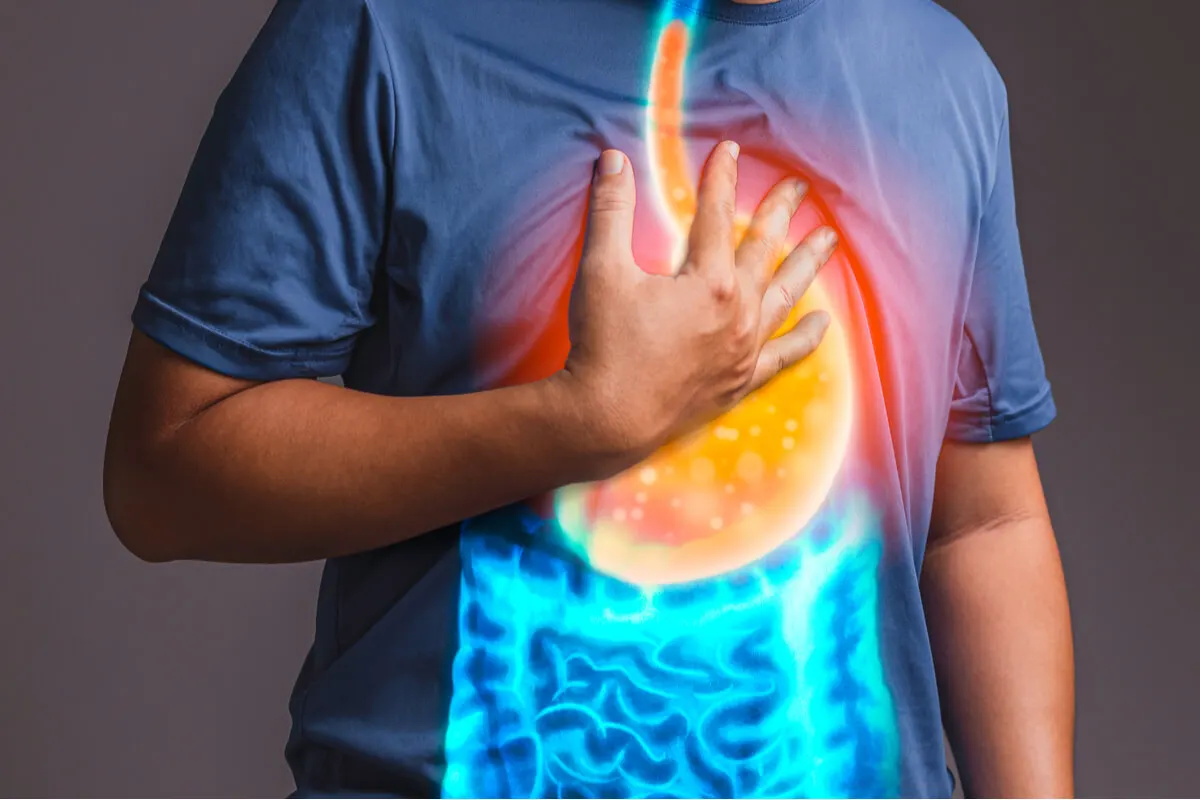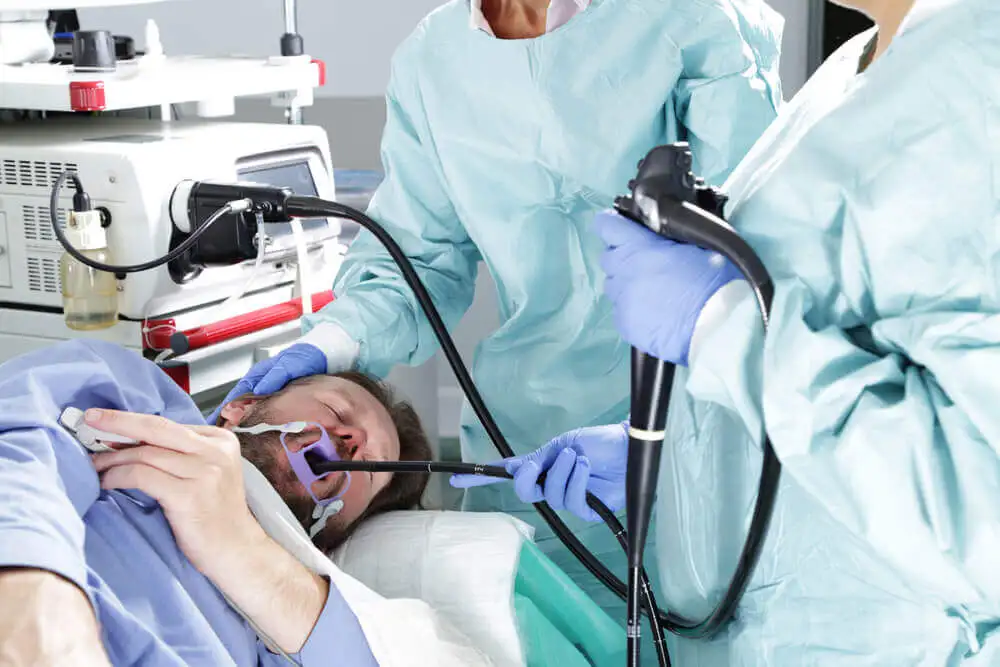Food Impaction: What Is It and How Is It Treated?


Written and verified by the nutritionist Saúl Sánchez Arias
Food impaction is the process by which food gets stuck in the esophagus. This phenomenon can be caused by problems with chewing, which hinders subsequent swallowing. On the other hand, the situation may occur because the esophageal muscles aren’t working as they should.
The latter may be due to an illness or injury. In any case, it’s important to identify the problem in order to solve it.
Before we begin, it’s important to point out that digestion begins in the mouth, something that many people aren’t aware of. Eating in too much of a hurry can cause chewing to not be carried out properly, which will hinder all subsequent processes.
This first mechanical crushing is essential for the gastric juices to perform their functions optimally, achieving a prompt absorption of nutrients.
The basic physiology of digestion
Once the food is swallowed, a process is started from which the food goes down the esophagus through movements called peristaltic. These are executed thanks to the muscles that form the digestive tract.
If they’re not carried out correctly, the food could get stuck somewhere between the mouth and the stomach, generating an uncomfortable sensation. Such an accident is known as “food impaction.”
In fact, food impaction can be caused by a dysphagia problem. This is the name given to the difficulty in swallowing, as stated in a study published in the journal Communication Disorders, Audiology and Swallowing.
This disorder can occur at any stage of life, even during childhood. Among the most common causes of dysphagia are allergies, diffuse spasm, functional disorders, gastroesophageal reflux disease, and opioid dysfunction.
In general, the symptoms of dysphagia are mucus accumulation in the esophagus, chest pain, food impaction, a feeling of tightness in the throat and weight loss. It’s normal for patients suffering from this condition to often refuse food because it causes them problems and discomfort when eating.

We think you may also enjoy reading this article: 11 Foods that Affect Your Digestion and Lead to Constipation
When to see a doctor about food impaction
If food impaction only occurs every now and then, it may not be necessary to consult a specialist. This may be due to poor chewing. It may even be due to not eating well. It’s often enough to improve your overall eating habits to solve the issue, thus avoiding unnecessary discomfort.
However, when the sensation of choking is noticed constantly after eating or of having something stuck in the throat or when there is associated difficulty in breathing, the best thing to do is to consult a doctor. Even in the most extreme cases, you may even experience vomiting after eating, making food impaction a real emergency.
In these cases, the first thing to do is to take a medical history, which will be accompanied by the execution of an X-ray to evaluate the place where the food is located. Afterwards, an endoscopy may also be performed to correctly assess and diagnose the impaction.
Treatment options include the use of certain drugs that relax the esophageal muscles, thus improving the movement of food into the stomach. These include butylscopolamine, glucagon, calcium channel blockers, benzodiazepines and nitrates. The latter have been shown to promote tissue relaxation.
Like this article? You may also like to read: Improve Your Digestion with This Papaya and Almond Milk Smoothie
How to prevent food impaction
It is possible to prevent alimentary impaction in many cases. Sometimes, this phenomenon is caused by eating too fast or even chewing too little.
In fact, even eating too quickly could increase the risk of suffering from this symptomatology. Therefore, it’s often enough to take time to swallow while trying to ensure that the first digestive process is carried out efficiently.
Prioritizing fresh foods over processed foods or hyper-palatable products will also limit the frequency of this disorder.
However, when impaction is caused by the existence of a condition of the esophageal structure or function, it’s always best to seek medical attention. In certain cases, there may be a stricture or narrowing of the tube, which complicates the passage of food down the tube.
Reflux situations may also lead to food impaction in some people. In this case, it’s best to implement dietary strategies that restrict the presence of irritating foods that can worsen symptoms in your diet. In fact, a study published in the journal Current Opinion in Gastroenterology confirms this.
Prevention and early treatment are keys to treating this disorder. If reflux persists over time, the esophageal epithelium may become altered.

Food impaction is a digestive problem
Food impaction is a disturbance in the digestion process that can cause significant discomfort. In some cases, it’s even a reason for emergency consultation.
However, it can usually be prevented by improving your eating habits and ensuring that an adequate diet is followed. If it persists, more complex diagnostic tests should be performed to evaluate the origin.
Keep in mind that there are other extradietetic conditions that may be closely related to the occurrence of alimentary impaction. An example of these would be obesity or weight gain. When the percentage of body fat increases, the organs located inside the body are under pressure, including the esophagus.
All cited sources were thoroughly reviewed by our team to ensure their quality, reliability, currency, and validity. The bibliography of this article was considered reliable and of academic or scientific accuracy.
- Etges, C. L., Barbosa, L. R., & Cardoso, M. (2020). Development of the Pediatric Dysphagia Risk Screening Instrument (PDRSI). Desenvolvimento do Instrumento de Rastreio Para o Risco de Disfagia Pediátrica (IRRD-Ped). CoDAS, 32(5), e20190061. https://doi.org/10.1590/2317-1782/20202019061
- Bahadoran, Z., Mirmiran, P., Kabir, A., Azizi, F., & Ghasemi, A. (2017). The Nitrate-Independent Blood Pressure-Lowering Effect of Beetroot Juice: A Systematic Review and Meta-Analysis. Advances in nutrition (Bethesda, Md.), 8(6), 830–838. https://doi.org/10.3945/an.117.016717
- Sethi, S., & Richter, J. E. (2017). Diet and gastroesophageal reflux disease: role in pathogenesis and management. Current opinion in gastroenterology, 33(2), 107–111. https://doi.org/10.1097/MOG.0000000000000337
This text is provided for informational purposes only and does not replace consultation with a professional. If in doubt, consult your specialist.








